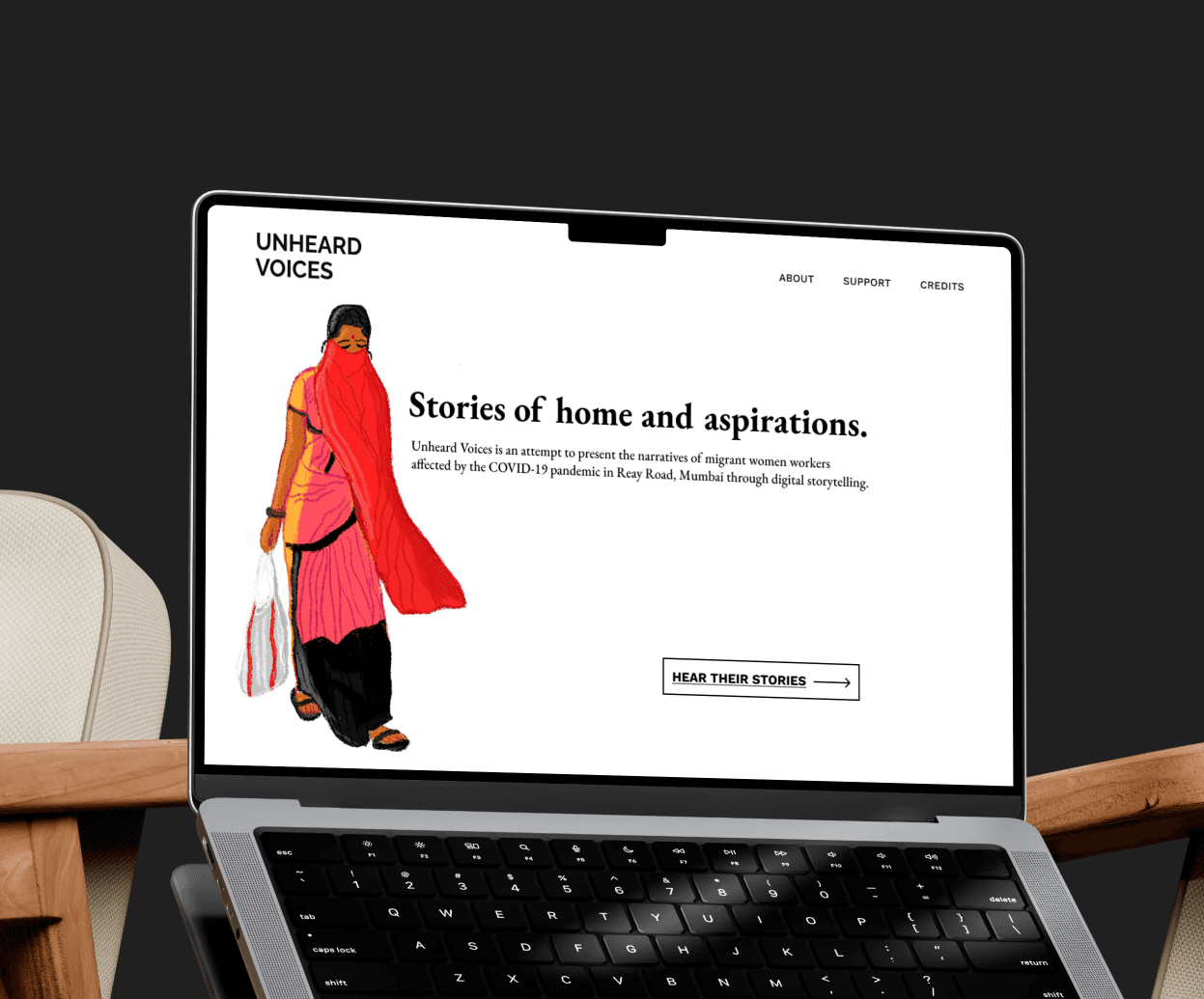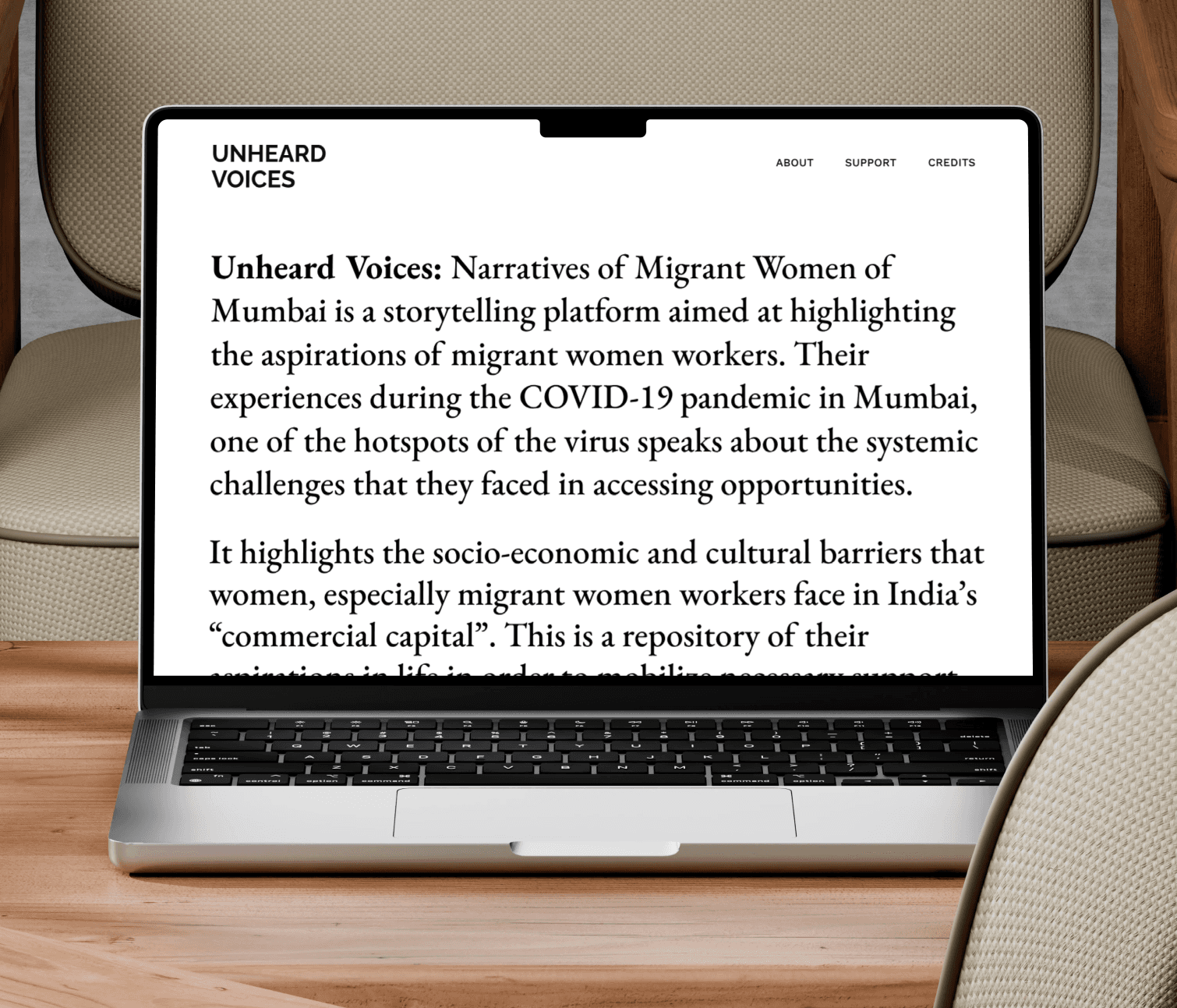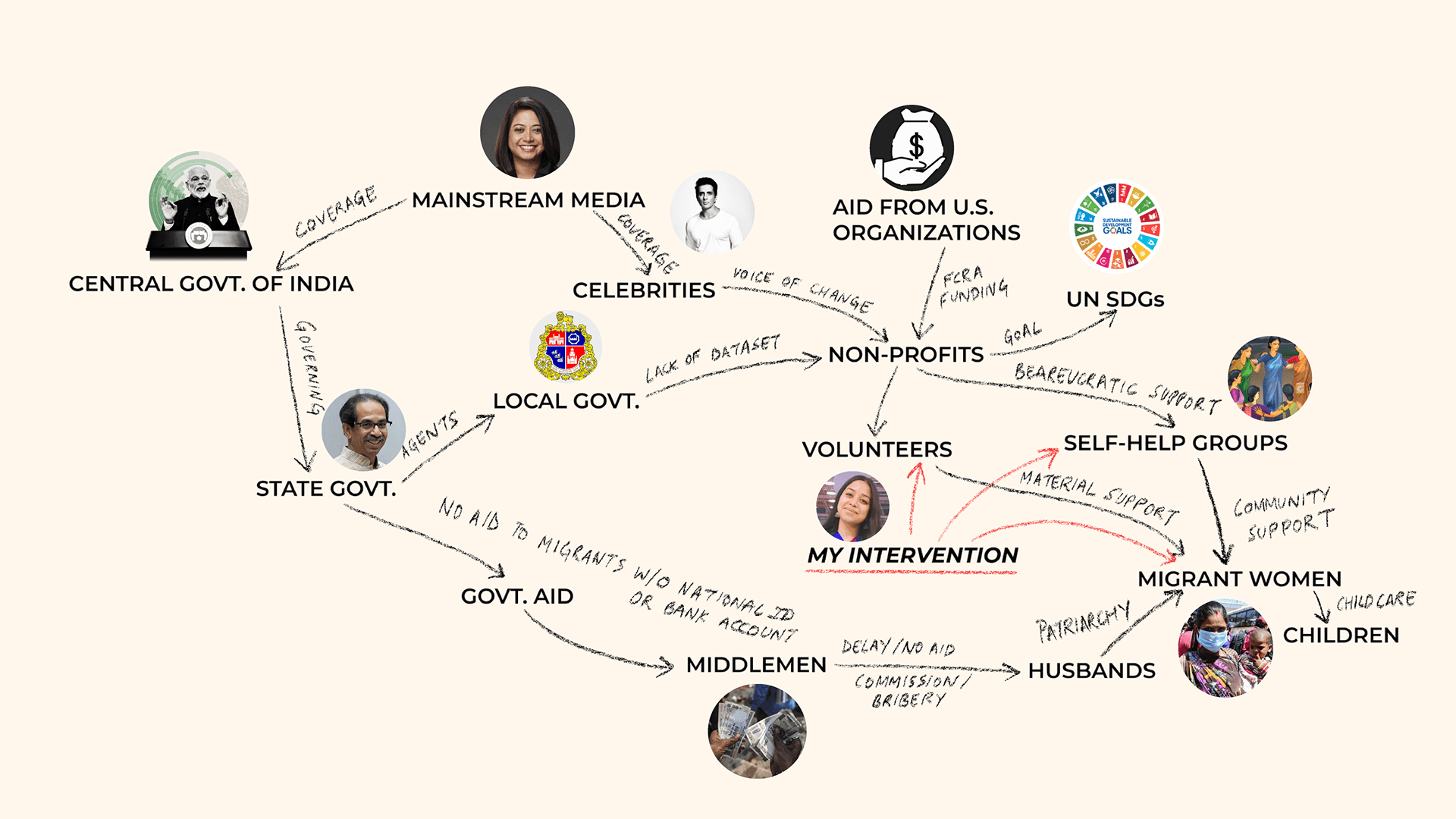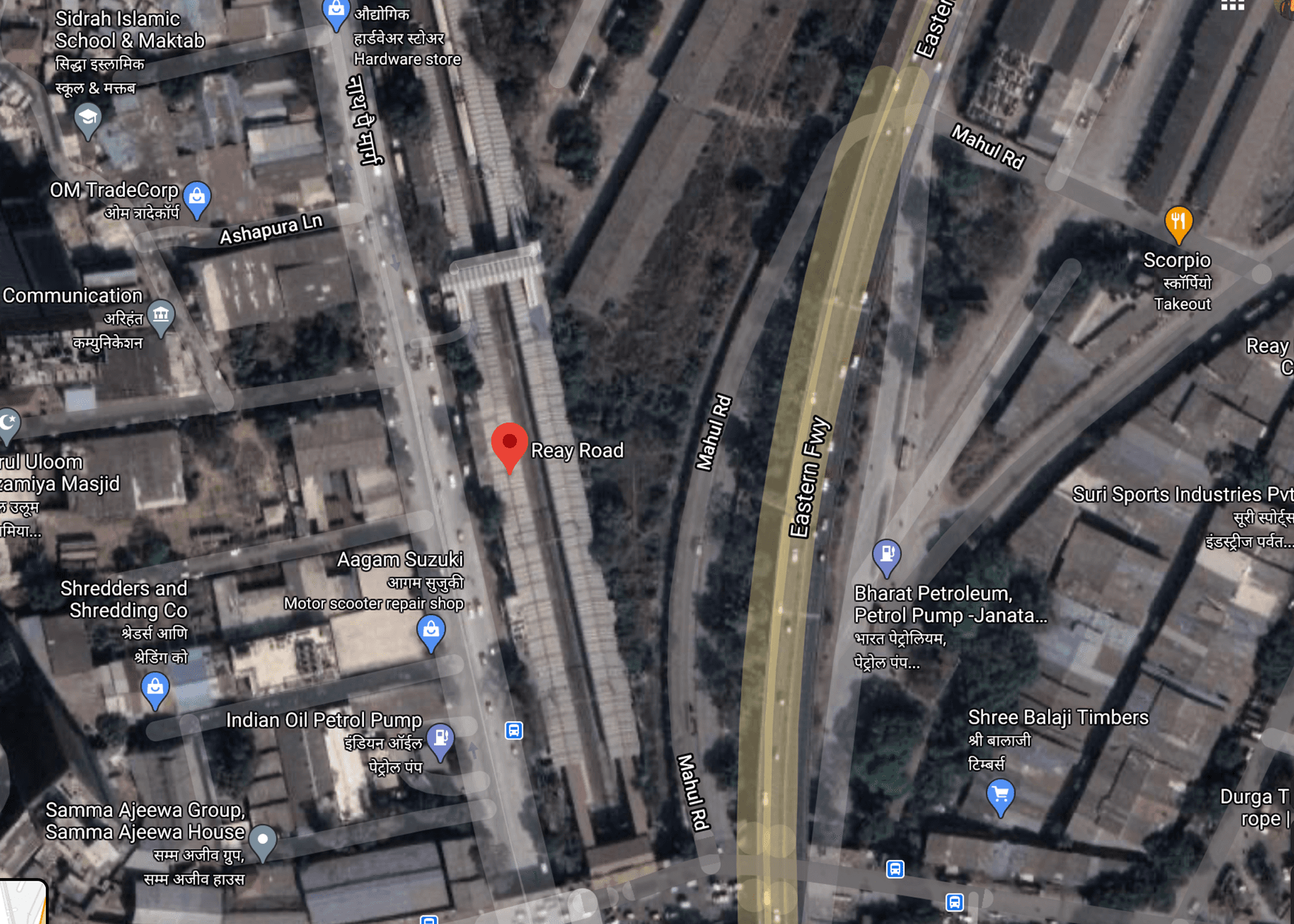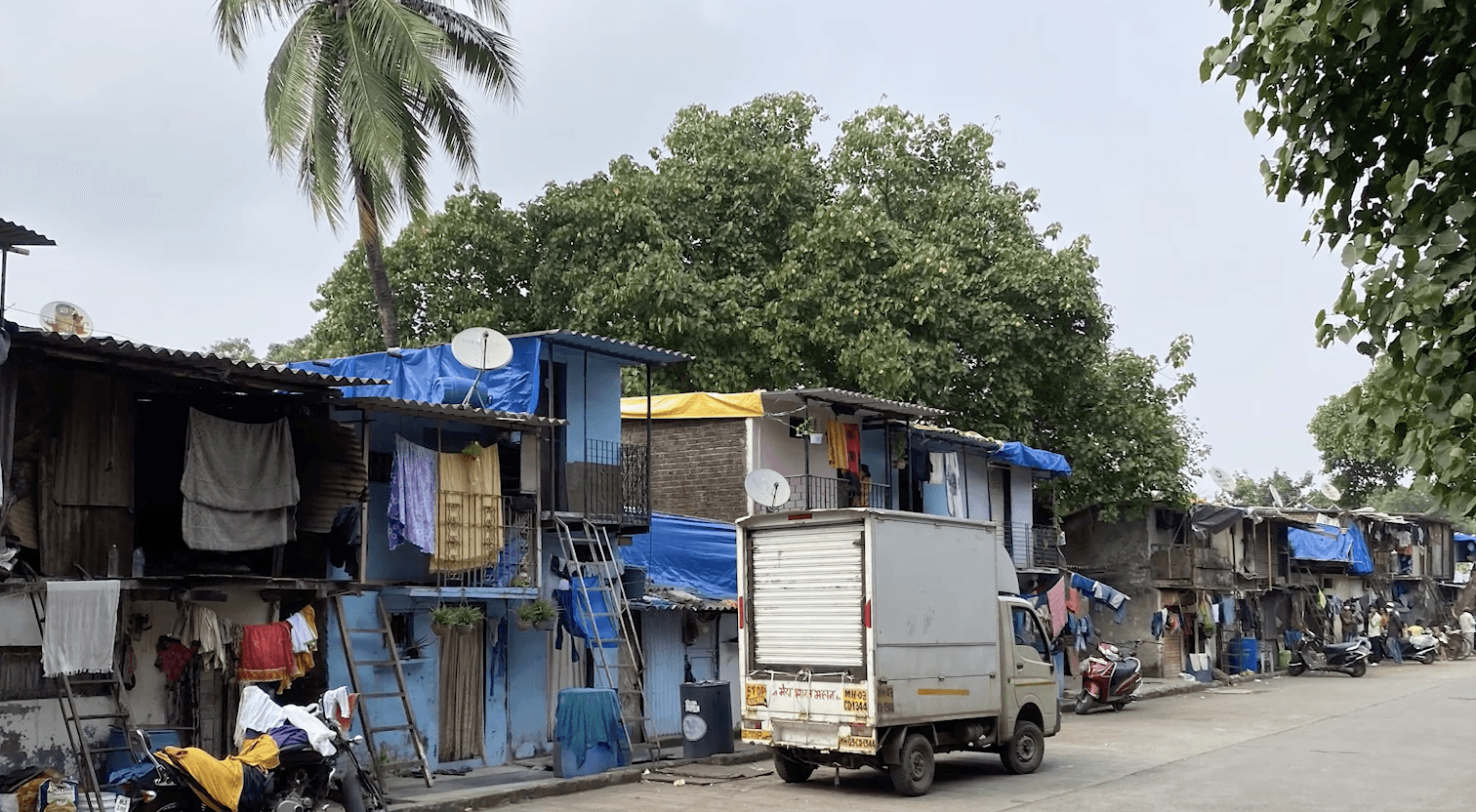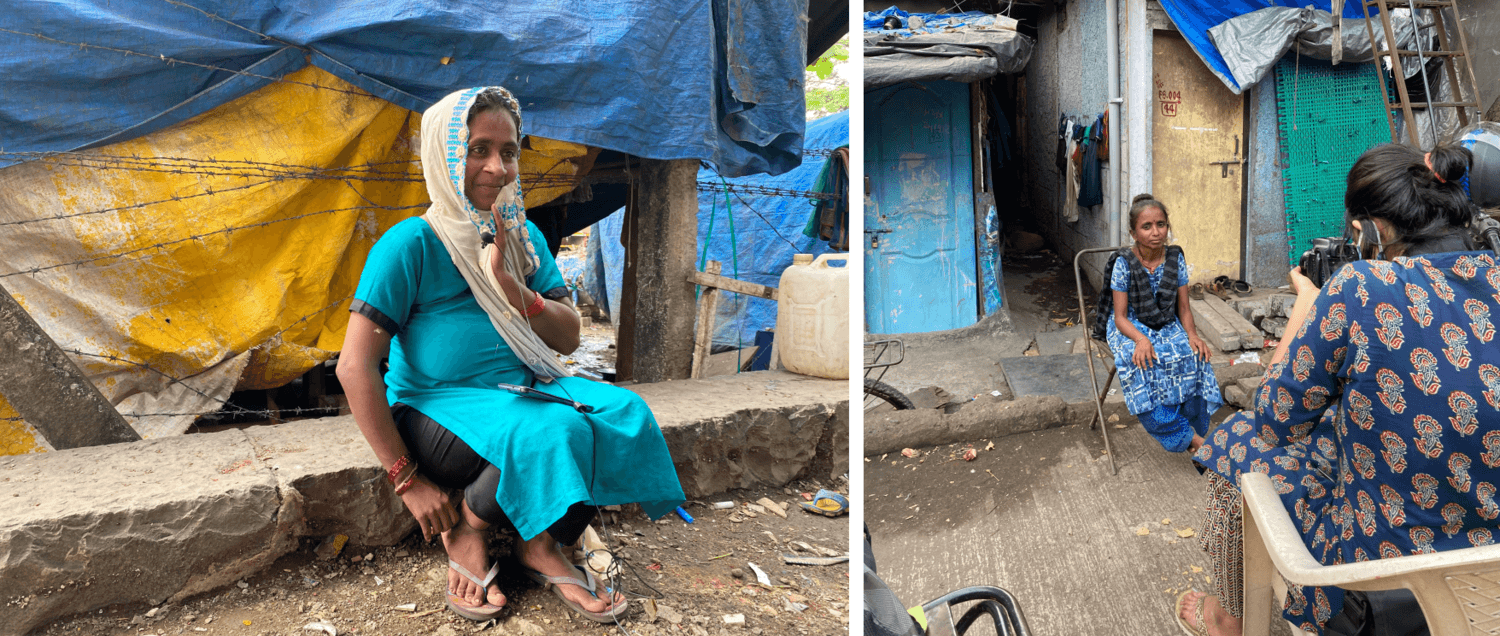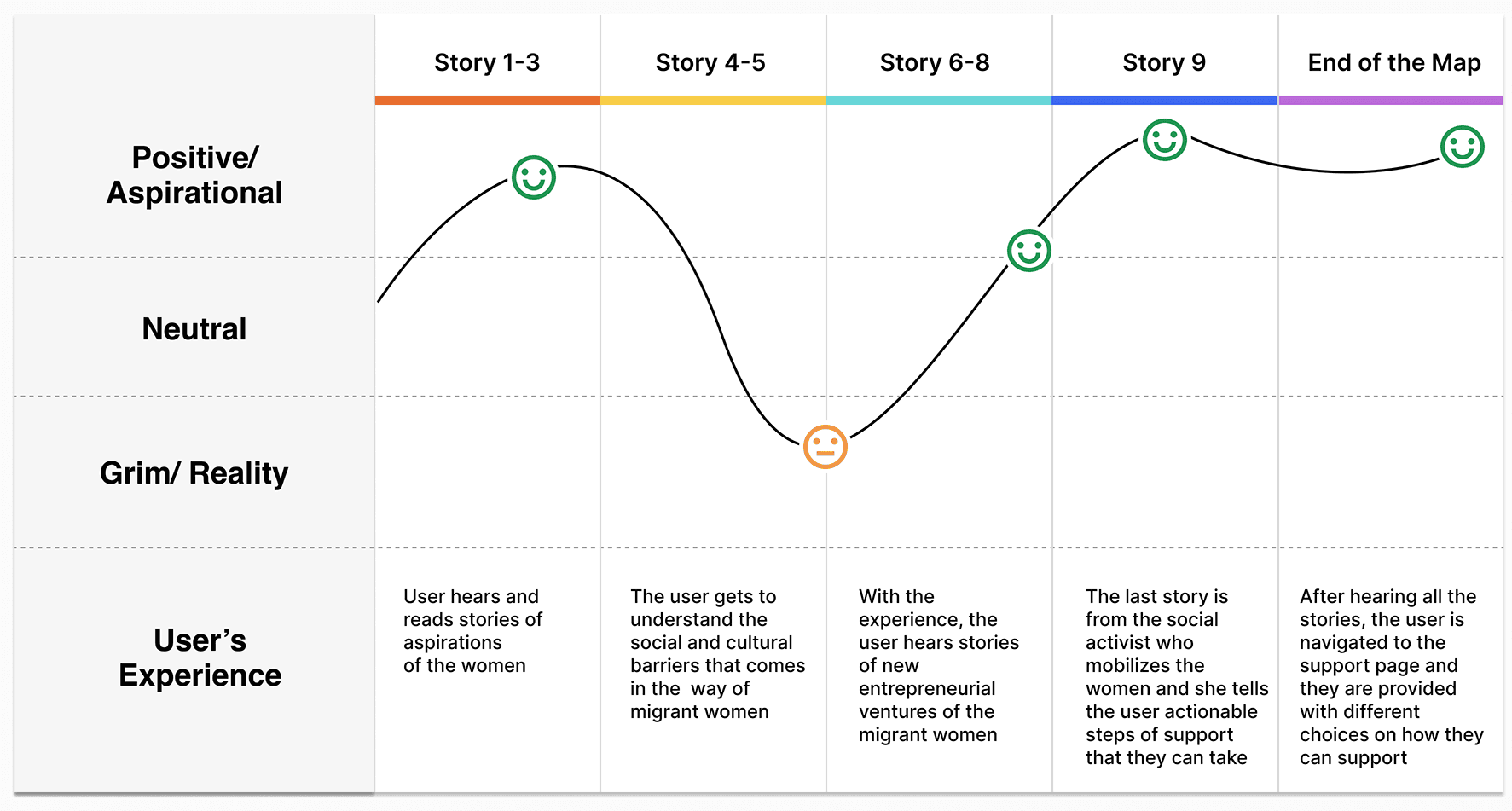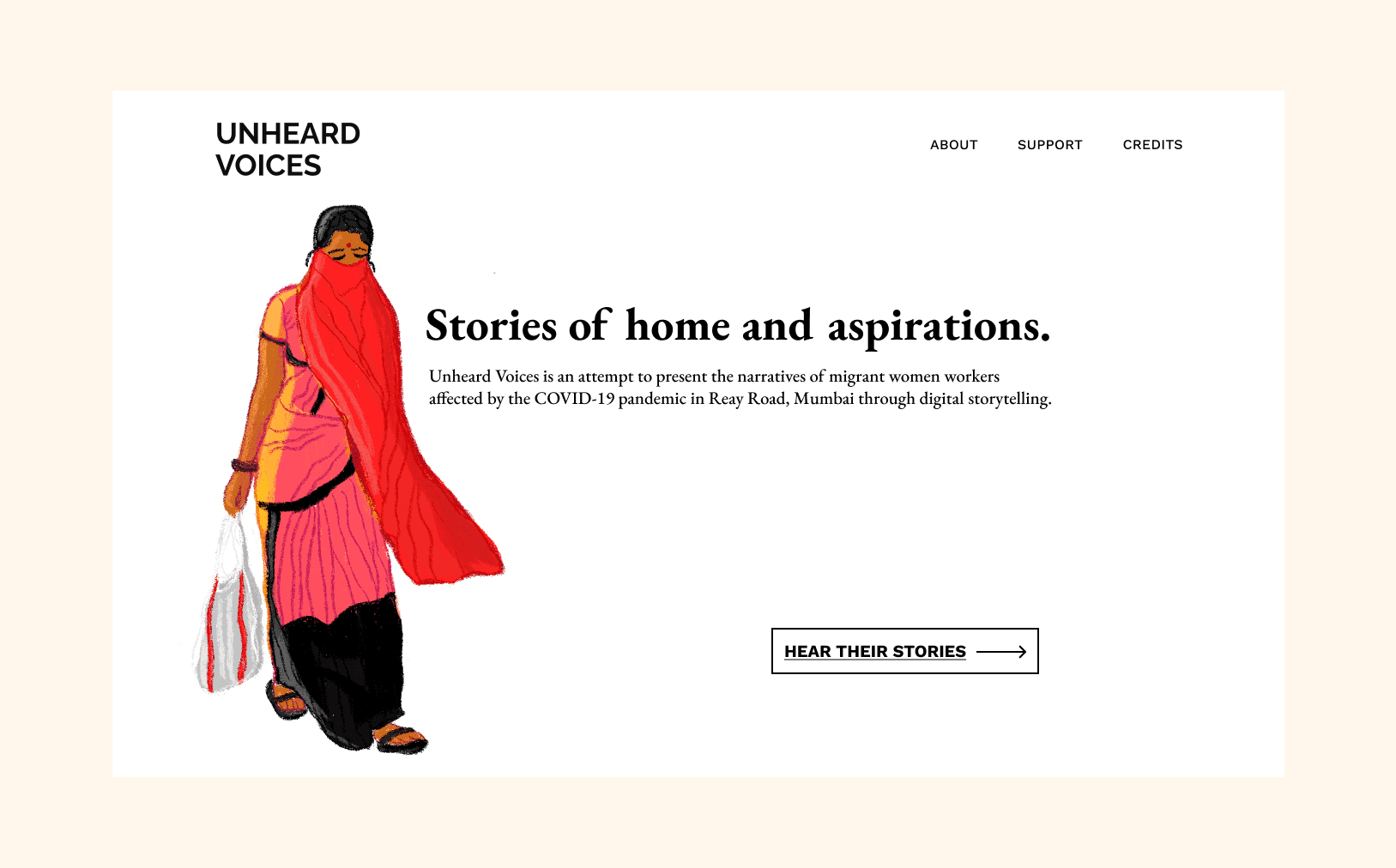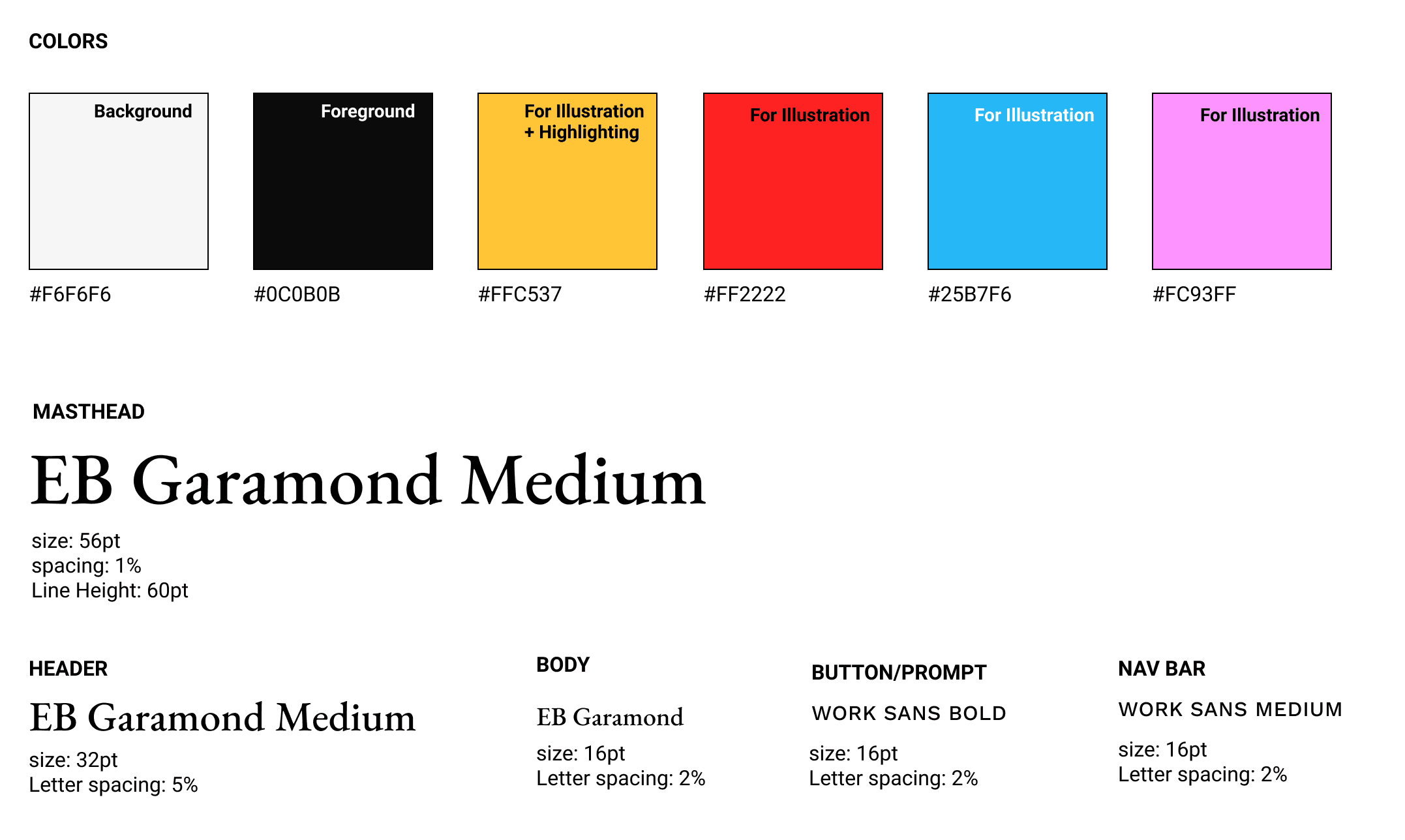Unheard Voices — A storytelling platform amplifying the narratives of Mumbai's migrant women impacted by the COVID-19 pandemic.
Project Type
Master's in Design and Technology Thesis + Storytelling Platform
Honors & Recognitions
$50,000 Schmidt Futures Reimagine Challenge Tuition Scholarship and Award, Academic Honors for Community-building, and The New School Student Research Grant
Toolkit
Figma, Adobe Illustrator, Adobe After Effects, Procreate, HTML, CSS, and Javascript, Ethnographic Research, Usability Testing, Storytelling with Qualitative Data, Cultural Probe Kits
Collaboration
Khaana Chahiye Foundation, Prof. Anezka Sebek, Neeraj Shetye (Fieldwork), Mithila Naik-Satam (Fieldwork), Akshay Khurana (Web Developement)
Unheard Voices is an interactive storytelling platform that highlights the aspirations of migrant women workers in Mumbai. Through their experiences during the COVID-19 pandemic—a time when Mumbai became a hotspot for the virus—the platform sheds light on the systemic challenges these women faced in accessing opportunities. It explores the socio-economic and cultural barriers that particularly affect migrant women in India’s financial capital.
This initiative serves as a repository of their aspirations, aimed at mobilizing essential support for the community through grassroots partnerships. Unheard Voices originated from my award-winning proposal for the Schmidt Futures Reimagine Challenge 2020 and has been developed in collaboration with the Khaana Chahiye Foundation.
Process
I utilized a structured process of empathizing, researching, defining, ideating, developing, and reflecting for the Unheard Voices project to authentically represent the experiences of migrant women workers in Mumbai. This approach started with engaging directly with the women to gather insights, which informed the subsequent research and problem definition, ultimately guiding the creative ideation and development of the storytelling platform. The delivery phase enabled continuous improvement, ensuring that the platform effectively highlighted their narratives and garnered vital community support.
Start with Empathy
In March 2020, the Indian government instated a nationwide lockdown in response to COVID-19, leaving migrant workers without sufficient time, urgent aid, or resources. Without jobs and transportation, many families walked hundreds of miles to return to their rural homes, with marginalized women and their children suffering the harshest consequences as existing inequalities worsened. Mainstream media largely ignored the voices and needs of these women, revealing a significant lack of gender awareness. Recognizing the pandemic's disproportionate impact on women and children, I was motivated to create an intervention to support affected migrant communities.
From a long-term perspective, Unheard Voices aims to support the United Nations Sustainable Development Goals 2030 for achieving #5: Gender Equality and Women Empowerment. More specifically, the long-term project-specific goals function in tandem with five other Sustainable Development Goals.
Research
Forming Local Partnership
To support the on-ground fieldwork for this project, I collaborated with field researchers Neeraj Shetye and Mithila Naik-Satam from Khaana Chahiye Foundation (translation: need food), a non-profit organization in Mumbai. This foundation works alongside local government bodies to drive systemic policy change, focusing on the urgent need for food and resources.
Funding the research for discovery-driven design
The fieldwork and platform development were funded by The New School Student Research Award Grant. Additionally, I was honored to receive the Schmidt Futures Reimagine Challenge Scholarship and Award for my proposal focused on long-term community impact. This proposal has been published as an online anthology, which helped garner media attention for the crisis faced by migrant women workers and highlighted the need for community support for the project.
System Map
The user research process began with a discovery phase, during which I identified key components of the intervention using a service blueprint. I analyzed the current landscape by creating a System Map, which helped pinpoint key stakeholders within the larger system of change and clarified where my intervention fits. Additionally, I utilized Donella Meadows' Places to Intervene in a System as a valuable resource for framing the project.
Women in the targeted communities face cultural and socio-economic barriers that hinder their ability to share their viewpoints and engage in the process. Therefore, understanding the landscape is crucial, as this project addresses a complex issue involving multiple stakeholders.
Fieldwork
With the support of remote field volunteers and research collaborators, the fieldwork for Unheard Voices began in Reay Road, Mumbai, India — an erstwhile spot for Mumbai’s mills and factories. Today, it’s mainly known for the century-old station on the Mumbai Suburban Rail network (famously known as Mumbai’s local trains). The Mumbai Port Trust hosts their godowns here but a community has settled here over the past three decades.
Stakeholder Interviews
Co-design, collaboration, and participatory design are the core of this project. Women are the key stakeholders. The stakeholders share ownership of the design process. We began the user interview process by asking questions to the migrant women. The prepared questions were open-ended to facilitate a quantitative conversation rather than a yes/no answer. We also interviewed the field volunteers, Self-Help Group leads as well as the non-profit organizations working towards supporting the women.
Cultural Probes Kit
Cultural Probes is an approach adopted from design research applying the methods described in Doing Fieldwork In A Pandemic by Deborah Lupton. The cultural probe involves developing kits of materials that are at the end left with research participants to complete in their own time. In this case, the kit comprises essential items such as sanitary napkins, ration package, water bottles, masks, sanitizers, flip-flops, disposable cameras, and a paper journal with crayons or markers for their children.
Define
Focused User Groups
Migrant Women of Reay Road — To share the viewpoint and gather necessary support.
Local government and non-profits — For collaboration and aid in supporting the women.
Audience in the United States — Since I am pursuing this project remotely here in the United States, I want to highlight the stories of the resilient women of Reay Road to the western audience. The idea is to build empathy and get international attention to support for the development of the community in Reay Road.
Audio-Video Stories
The qualitative data and insights from the research were synthesized into stories. Stories unveil opportunities for development and improvement. Stories have the power to make decision-makers move in a way that statistics and reports often cannot. They bring out information that is emotionally compelling, something that is not achievable through collecting user surveys. The focus was to talk to the women (with their consent) and understand their viewpoint to craft a personalized narrative.
User Journey Mapping
To build empathy, I wanted the user to go through an uplifting journey and building compassion while reading and hearing the different stories of the women. The idea is to introduce the stories of aspirations, in the beginning, diving deeper into the social and cultural barriers in the middle and in the end providing an actionable outcome that the user can take to support the women.
User Flows
To create the user flow and the wireframes, I used Figma to showcase my idea into a design. I rapidly prototyped the user flow keeping in mind the various interactive components on the map. Visualizing the wireframes gave me a holistic view of the design and I was able to get feedback from my critics to refine the design further.
Develop
The synthesis of research data led to the idea of a horizontal scrolling web-based interactive map where the user can navigate the different stories of the women. The interactive elements will be in the form of an audio-visual narrative in which illustrated visuals form a key component.
Visual assets and illustrations
I created digital illustrations to represent the women of the Reay Road community, anonymizing their identities while honoring their humanity. These illustrations depict the women in the comfort of their surroundings as they share their stories and aspirations. My goal was to visually portray them with dignity, avoiding exploitative stereotypes, and ensuring their agency is preserved throughout the process.
Design System and Wireframing
Deliver
Unheard Voices platform was presented at Parsons School of Design's PARALLEL '21 Symposium as part of the Education + Action Category.
